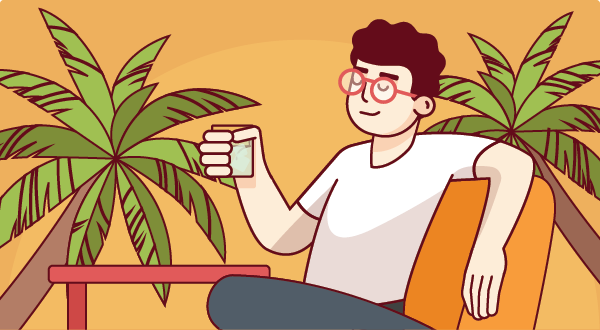Wil Schroter

Founders need to be as militant about recharging as they are about working.
Yet, nothing in front of us suggests slowing down or taking a break to do it — at all. We have a mountain of work, no one to help us, and we're burning through what's left of our cash and credit. The last thing any of that suggests is "Let's plan a sweet vacation!"
What we're missing in this mess is the fact that it's not about whether or not we want to take a break — it's that we have to. If we're going to run the marathon that is the startup journey, we can't just go full sprint 24x7 and pretend it'll all work out. Instead, we have to become highly regimented in our plan to recharge all the time, and treat that recharge as seriously as we treat our startup.
Move to Milestones
If we think about finding a "rest period" at the end of the journey, we're essentially planning on running ourselves into the ground. Startups take 7-10 years to be successful (if we're even successful) which means waiting until the end isn't an option.
Instead, we've got to formulate strict milestones that give us finish lines along the way. Part of that challenge is determining what a finish line mid-way through the journey even is. One great way to do this is to group the milestones within a few months of each other. For example, if we're building a new product, that timeline might be over a year. So we have to plan a milestone that exists within two months to reset ourselves.
The milestones are critical, and we have to take them super seriously. If we don't, and we constantly make an excuse to say "Well, this still needs to get done, so let me just push some more..." we're not really risking the moment, we're risking the whole journey. That's the part we never seem to understand.
Recharge to Move Faster
We exert ourselves in a startup like anything else in life, we just don't quite see it the same way. When we lift weights, we don't just keep on lifting the same weight all day. We hit a threshold where our bodies exhaust themselves and we're no longer able to exert our maximum effort like before.
Our minds are no different. Running for 16 hours per day nonstop doesn't lead to our best selves. What we're doing is trading quality output for quantity output. No one is doing their best work 16 hours into the day — we're just "working." What moves the meter isn't "just working," it's when we're doing our best work which requires a solid recharge to get it.
So, while this is probably a bit psychotic, let's agree that in order to work more, we need to rest more. Instead of feeling guilty about the rest, let's feel guilty about not recharging. Let's feel guilty about giving a half-assed effort to our startup because we weren't disciplined enough to pace ourselves. Is guilt the best solution? Probably not, but the guilt of not working seems to be pretty effective, so...
Use the Buddy System
The best way that I've found to stay accountable to recharging is to ensure that the people I work with do the same. It's kind of like the "buddy system" from summer camp. I know I'm going to do a shitty job of convincing myself to take breaks, so if I make it a big deal to ensure that others do it, it creates the momentum for me to do the same.
A big part of where we still are lacking is "permission" to take a break. On the other hand, it's fairly easy to give someone else permission to take a break. By spreading that permission around, it's easier to ensure that we'll do the same for ourselves. Nothing reminds us that we need a break like watching someone else on the team take one! What's more, it's a lot easier to take a break ourselves when everyone else is encouraging us to do it. We have to socialize this behavior to make it actually work.
We're never going to "feel amazing" about taking breaks — our workaholic Founder Guilt almost prevents it! But if we build some systems in place to help drive consistent recharge moments along the way, we'll actually supercharge our progress toward the big goal we're all working so hard for, to begin with.
In Case You Missed It
Optimizing for Happiness (podcast). What if our work hours gave us more time with our kids or who we worked with were only the people we enjoyed the most? The key is thinking about our startup differently by using "personal happiness" as a core tenet of how the company works.e
How to be a Happy Entrepreneur. Everything about entrepreneurship works against our basic human desires for comfort, stability and predictability. So, how do we keep ourselves happy and sane while we’re on the path to creating a better life for ourselves, and a better world for others?
Founders, You Can Take a Vacation. Productivity expert Dr. Ken Yeager drops some science and points out exactly how much bullshit is built in to startup Founders’ excuses as to why we’re just way too important to take a vacation.
Find this article helpful?
This is just a small sample! Register to unlock our in-depth courses, hundreds of video courses, and a library of playbooks and articles to grow your startup fast. Let us Let us show you!
Submission confirms agreement to our Terms of Service and Privacy Policy.
Already a member? Login
No comments yet.
Start a Membership to join the discussion.
Already a member? Login
